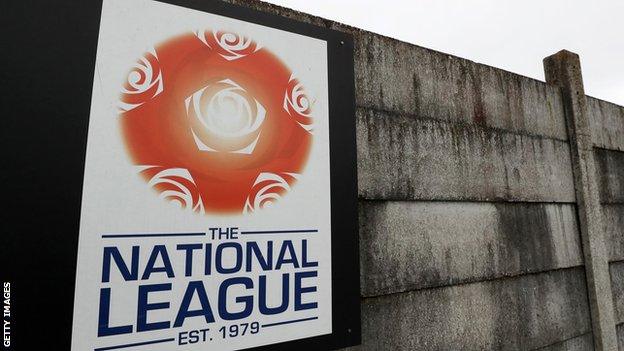National League: Loans or a suspended season are club options due to Covid-19 pandemic
- Published

The National League's three divisions are the only levels of non-league football classed as elite sport
National League clubs have been given three options regarding their season after being told loans were the only source of government funding available.
On Wednesday, National League interim general manager Mark Ives presented clubs with three choices.
He said they could access individual loans, share a central loan paid to the National League, or suspend the season.
The latter option is viewed as a last resort given clubs have already received £10m of UK government funding.
That grant funding has now expired and further grants have been ruled out, unless in exceptional circumstances.
A suspension to the season would have a negative impact on sponsorship and commercial deals, and could also lead to the potential loss of the National League's 'elite' status.
The top two levels of England's non-league system are currently classified as elite which - among other things - meant they were allowed to continue playing when new restrictions were imposed by the government in January amid the ongoing coronavirus pandemic.
During Wednesday's talks, clubs were also told to maintain pressure on MPs in the hope of changing the government's mind over the issue of grant funding.
Loans would be managed by Sport England and are repayable over 10 years at an interest rate of 2%, although there is thought to be an option for extensions and a payment break.
The National League is understood to be committed to an open and transparent model should it take on the loan on behalf of its clubs, although it is not completely clear whether clubs would make repayments themselves or have future central payments withheld.
Clubs had to respond to Ives' proposals by the end of Wednesday, with further discussions among the National League board scheduled for Thursday before another meeting with clubs on Friday.
While the National League feels it is doing its best in a difficult situation, there is anger around the funding issue.
The majority of clubs only started the season in October because they thought grants would continue to be paid if matches were still being played behind closed doors when the first portion of funding ran out in December.
In addition, some clubs are furious with the National League board over the funding model it adopted between October and December to distribute the government's £10m. Most clubs had anticipated the money would be distributed on a pro-rata basis in order to cover lost gate receipts - but instead the board split clubs into four bands, and handed out the funding equally across each band.
It meant that every club in the lowest band got £30,000, and every club in the highest band got £95,000 - even though there were significant differences within each band when it came to lost gate receipts.
Some clubs have argued the system has disadvantaged them, and feel so strongly, they have taken legal advice over the issue.
An independent review, led by former Football Association chairman Brian Barwick, is believed to have been heavily critical of the National League board's conduct. Bernstein later criticised the league's lack of action in response to the review's recommendations, saying it had rendered the panel's efforts "pointless".

Excelling at esports: Can this British team make an impact on the global scene?
The show must go on in lockdown: David Tennant and Michael Sheen star in Staged
